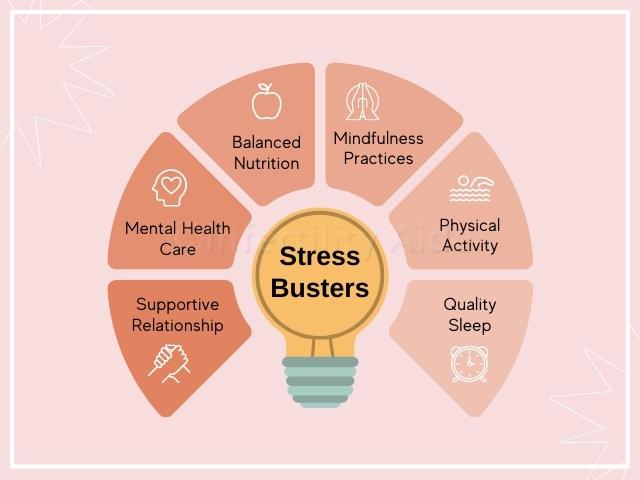Stress is not good for conceiving and doctors would normally advise you to stay calm and relaxed during the process. However, it’s natural to be a little worried when you’re spending so much but can stress affect your IVF success? We find out:
A Swedish study found that among twenty-two women who went through IVF, the physiological stress levels among those who did not become pregnant were slightly higher than those who did achieve pregnancy (1).
Research has also linked physiological stress with reduced reproductive outcomes from reduced oocyte quality and cell death (2). Thus, knowing how to manage stress effectively during IVF could be more important than you think.

Can embryo implantation fail due to stress?
A small prospective cohort study measured physiological stress in IVF patients in 2017 and 2018 using salivary cortisol measurements. The researchers observed that stress in most women increased 28% in the pretreatment phase, reaching a high by oocyte retrieval day and then decreased by 12% by the time of embryo transfer.
The researchers in this study cautiously concluded that psychological and physiological stress do not affect IVF outcomes (3).
However, this study only accounted for the stress related to the IVF treatment itself and not the concerns caused by general personal or professional factors, which may adversely affect your gametes and fertility in the long run.
How to make IVF less stressful?
Here are a few things you can do to stay calm during your IVF journey and optimize the possibility of a positive outcome:
1. Ask questions
Before starting IVF, make sure to research the procedure and prepare yourself mentally. Find communities, healthcare workers, and consult with multiple doctors, if required.
2. Find a good support system
While it is recommended to ask your friends and family for emotional support during any medical procedure, not everyone will have the care they need by their side during IVF.
It might be even more difficult for single women opting for IVF.
Being alone for an important and emotional treatment like an IVF can cause a person to feel disheartened and anxious, but you can connect with family to discuss your situation, talk to a therapist about your worries regarding the process and come to terms with all possible outcomes, and even talk to your doctors and nurses.
3. Get enough rest
Rest is vital for a healthy body and mind. You cannot expect to have a calm demeanor approaching your procedure if you are tired and have a dozen scenarios running through your mind. Getting good rest will allow you to think clearly, voice your feelings and concerns better, and make you feel at ease.

4. Exercise and yoga
Mild exercise and movement are good for both the body and mind, especially while undergoing hormonal treatment.
Yoga is not just about uncomfortable stretches; it is a programmed combination of rhythmic breathing and stretching, which helps improve blood flow, massage your organs internally, and stretch your muscles, helping both your mind and body relax.
5. Healthy diet
IVF diet is aimed at provide optimum nutrition for the egg and sperm to positively affect the success of IVF.
Foods rich in healthy fat like avocados, fish oil, and nuts can play a vital role in balancing your reproductive hormones, and protein and minerals have anti-inflammatory and body-protective functions. Water and fiber help the body eliminate toxins.
Certain food items are also associated with negative effects on fertility, mental health, and general health. These include alcohol (4), caffeine, soy, and foods with high mercury content.
6. Pamper yourself
IVF involves too many appointments, calls, and tests, which can be taxing. It is important that you make it to the appointments without pushing yourself too hard. Many women who underwent IVF advise to clear your calendar of non-essential events and make room for appointments and relaxation.
Allow yourself some time to see and appreciate the gradual changes in your body rather than just confronting it after the process and thinking that IVF ruined your body.
7. Acupuncture
Research has shown that acupuncture during IVF brought about relaxing effects that further aided in the success of the procedure (5).
After discussing with your doctor, you can consider making appointments twice a week during the follicle stimulation phase, before and after embryo transfer, and weekly till your pregnancy test.
8. Anxiety medications
If you are taking regular anxiety medications, be sure to discuss with your doctor about whether or not they might affect your IVF treatments and pregnancy.
The US CDC found a small increased risk for certain congenital disabilities with the use of some medications used to manage mental health conditions (6).
Researchers at the Brigham and Women’s Hospital found that men who suffered from anxiety had lower counts of motile sperm but the use of anti-depressants IVF did not adversely affect IVF outcomes and live birth rates (7).
9. Meditation and deep breathing
Try practicing regular meditation like mindfulness or even simple breathing exercises to stay calm during IVF. Some methods of relaxation are:
- The benefits of deep breathing exercises have been known to the Indians for thousands of years. Now, Harvard Medical School (8) has also found that deep breathing “can slow the heartbeat and lower or stabilize blood pressure.” For long-term benefit, make this a daily routine.
- You can lie down, close your eyes, and clench and relax your muscles, starting from the face to your toes.
- Practice mindfulness, where you focus and tune into your senses and notice your thoughts and emotions.
On studying the effects of mindfulness-based intervention on Chinese women undergoing their first IVF-ET cycles (9), researchers found that these meditation techniques helped improve infertility-related quality of life for the participants. It also allowed them to have greater awareness, increased acceptance and helped them regain a sense of control over life.
“When I think about my infertility and IVF treatment, I am so sad and helpless. However, by focusing my attention on breathing in and out, I can return to calmness and relaxation. Breathing is just like my soul harbor. I am less irritable and impatient than before,” said a one of the participants.
“I divide unpleasant experiences into thoughts, emotions, and body sensations. Then I can respond to it in a creative way and not perceive it as overwhelming. Therefore, I have a greater tolerance for my IVF.”
While more research is needed for definitive conclusion, let’s continue the discussion on the effect of stress IVF success.
References
- CSEMICZKY, G., LANDGREN, B.-M. and COLLINS, A. (2000), The influence of stress and state anxiety on the outcome of IVF-treatment: Psychological and endocrinological assessment of Swedish women entering IVF-treatment. Acta Obstetricia et Gynecologica Scandinavica, 79: 113-118. https://doi.org/10.1034/j.1600-0412.2000.079002113.x
- Prasad, S., Tiwari, M., Pandey, A. N., Shrivastav, T. G., & Chaube, S. K. (2016). Impact of stress on oocyte quality and reproductive outcome. Journal of biomedical science, 23, 36. https://doi.org/10.1186/s12929-016-0253-4
- Miller, N., Herzberger, E. H., Pasternak, Y., Klement, A. H., Shavit, T., Yaniv, R. T., Ghetler, Y., Neumark, E., Eisenberg, M. M., Berkovitz, A., Shulman, A., & Wiser, A. (2019). Does stress affect IVF outcomes? A prospective study of physiological and psychological stress in women undergoing IVF. Reproductive biomedicine online, 39(1), 93–101. DOI: 10.1016/j.rbmo.2019.01.012
- Rossi, B. V., Berry, K. F., Hornstein, M. D., Cramer, D. W., Ehrlich, S., & Missmer, S. A. (2011). Effect of alcohol consumption on in vitro fertilization. Obstetrics and gynecology, 117(1), 136–142. https://doi.org/10.1097/AOG.0b013e31820090e1
- Johnson, D., 2006. Acupuncture Prior to and at Embryo Transfer in An Assisted Conception Unit – a Case Series. Acupuncture in Medicine, 24(1), pp.23-28. https://doi.org/10.1136/aim.24.1.23
- Pregnant Women Report Taking Medicines for Anxiety and Other Mental Health Conditions https://www.cdc.gov/pregnancy/meds/treatingfortwo/features/pregnant-women-taking-anxiety-meds.html
- Brigham and Women’s Hospital. (2023, October 19). Study finds men’s antidepressant use did not negatively impact IVF success. ScienceDaily. Retrieved May 23, 2024 from www.sciencedaily.com/releases/2023/10/231019111326.htm
- Harvard Health Publishing; Relaxation techniques: Breath control helps quell errant stress response https://www.health.harvard.edu/mind-and-mood/relaxation-techniques-breath-control-helps-quell-errant-stress-response
- Masoumeh Sadat Hosseini, Parvaneh Mousavi, Khadijeh Hekmat, Mohammad Hossein Haghighyzadeh, Reza Johari Fard, Razieh Mohammad Jafari, Effects of a short-term mindfulness-based stress reduction program on the quality of life of women with infertility: A randomized controlled clinical trial, Complementary Therapies in Medicine, https://doi.org/10.1002/nop2.232
Reviewd by: Dr. Meenakshi, PhD